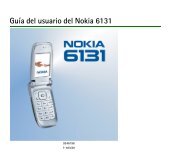Declaration of Conformity - Nokia
Declaration of Conformity - Nokia
Declaration of Conformity - Nokia
Create successful ePaper yourself
Turn your PDF publications into a flip-book with our unique Google optimized e-Paper software.
vehicle is mounted and operating properly. Do not<br />
store or carry flammable liquids, gases, or explosive<br />
materials in the same compartment as the device,<br />
its parts, or enhancements. For vehicles equipped<br />
with an air bag, remember that air bags inflate with<br />
great force. Do not place objects, including installed<br />
or portable wireless equipment in the area over the<br />
air bag or in the air bag deployment area. If invehicle<br />
wireless equipment is improperly installed<br />
and the air bag inflates, serious injury could result.<br />
Using your device while flying in aircraft is<br />
prohibited. Switch <strong>of</strong>f your device before boarding<br />
an aircraft. The use <strong>of</strong> wireless teledevices in an<br />
aircraft may be dangerous to the operation <strong>of</strong> the<br />
aircraft, disrupt the wireless telephone network,<br />
and may be illegal.<br />
Potentially explosive<br />
environments<br />
Switch <strong>of</strong>f your device when in any area with a<br />
potentially explosive atmosphere, and obey all<br />
signs and instructions. Potentially explosive<br />
atmospheres include areas where you would<br />
normally be advised to turn <strong>of</strong>f your vehicle engine.<br />
Sparks in such areas could cause an explosion or fire<br />
resulting in bodily injury or even death. Switch <strong>of</strong>f<br />
the device at refuelling points such as near gas<br />
pumps at service stations. Observe restrictions on<br />
the use <strong>of</strong> radio equipment in fuel depots, storage,<br />
and distribution areas; chemical plants; or where<br />
blasting operations are in progress. Areas with a<br />
potentially explosive atmosphere are <strong>of</strong>ten, but not<br />
always, clearly marked. They include below deck on<br />
boats, chemical transfer or storage facilities and<br />
areas where the air contains chemicals or particles<br />
such as grain, dust, or metal powders. You should<br />
check with the manufacturers <strong>of</strong> vehicles using<br />
liquefied petroleum gas (such as propane or<br />
butane) to determine if this device can be safely<br />
used in their vicinity.<br />
Emergency calls<br />
Important: This device operates using radio<br />
signals, wireless networks, landline networks, and<br />
user-programmed functions. If your device<br />
supports voice calls over the internet (internet<br />
calls), activate both the internet calls and the<br />
cellular phone. The device will attempt to make<br />
emergency calls over both the cellular networks and<br />
through your internet call provider if both are<br />
activated. Connections in all conditions cannot be<br />
guaranteed. You should never rely solely on any<br />
wireless device for essential communications like<br />
medical emergencies.<br />
To make an emergency call:<br />
Additional safety information<br />
189











